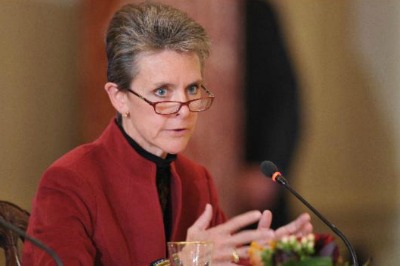Quotas on women in sports business should be “sledgehammer last resort”
August 12, 2016
By Christian Radnedge in Rio
Quotas on women in prominent roles in sports business should be “sledgehammer last resort”, adiposity one of the senior figures from Ernst and Young has told iSportconnect.
EY’s global vice chair of public policy Beth Brooke-Marciniak was speaking to iSC at the company’s ‘Women. Fast forward’ event at the World Olympians Association house in Rio de Janeiro, where International Olympic Committee president Thomas Bach was also in attendance, recognizing the achievements of women in sport.
There has been debate among the sports business world for some time now whether quotas should be brought in to ensure greater equality at board level. Some fear that it may prevent meritocracy, while others point to surveys taken in European countries showing that national corporate quotas are increasing the number of women in boardrooms.
Norway for example, was the first country in the world to mandate that women account for 40 per cent of its board seats. Last year the country had almost 36 per cent of female representation on the boards of its OMX-listed companies.
But Brooke-Marciniak, who also heads up EY’s Women Athletes Business Network, said that quotas should be a last resort for promoting gender equality.
“I’ve never been a big fan of quotas, but that’s not to say that they won’t be necessary” she told iSC.
“I like to call a quota ‘sledgehammer of last resort’. So I think you have to try everything else. Quotas aren’t necessarily realistic so you have to have sufficient women in your pipeline who can do everything you want them to do, so you can’t always go to the number of the quota automatically.
“We are in favour of an approach that is three-pronged; one is the politics, you need the government to use its voice to call for change, then you need ht e private sector, business, to actually take responsibility and make change and get more women in leadership. The final thing is you need transparency, you need to have numbers, show them to be involved and then share with your stakeholders where you are with percentages of women or whatever and have them use their voice.”

EY secured sponsorship of the Rio 2016 Games in 2011, in a deal understood to be worth more than $100m. The deal sees EY providing the professional services for the Games, but Brooke-Marciniak maintains that the women athletes business network is a big part of their activation here in Rio.
“We’re the professional services sponsor of the Games so we’re very involved in the delivery of the games. But in terms of our activation this was really a big platform project around our women athletes business network. The values of the IOC and the values of EY are very closely intertwined, we are committed to building a better world through sport and building a better working world.
“Our values on inclusion are completely in line so we came together and really focused this on women because we do think we have an opportunity to change the world by getting more women in leadership.”
The event on Wednesday evening was certainly boosted by the appearance of IOC president Bach who spoke of his wish to promote a more active role for women in all levels of sport. Bach confirmed in a speech that women athletes would reach parity with the men in terms of numbers competing for the first time at the Youth Olympic Games in Buenos Aires in two years’ time.
Last week at the IOC session, Bach confirmed the appointment of Winter Olympic champion Angela Ruggiero as the new chair of the IOC athletes’ commission, replacing outgoing chair Claudia Bokel.
Brooke-Marciniak said that the importance of having a role model such as Ruggiero in a prominent position was “huge”.
“We need more Angelas!” she said. “We need more women in those kind of positions. You need the role models, you need a voice at the table, you need enough voices, you need to get around 30 per cent around a table so their voice actually gets heard. I’m very proud of her.”

There could be many more following in Ruggiero’s footsteps fairly soon as Brooke-Marciniak confirmed that EY was taking on nine athletes after the Rio Games who would be ending their sporting careers.
Although she couldn’t name the athletes going on to be mentored in the women athletes business network, the American did highlight the strength of character these women had from their sporting careers: “They are unbelievable. Are they trained at what we do, no. Will they figure it out, yes. Give them a goal and they’ll figure it out on that very day.”
Although great strides have been taken in increasing gender equality there still remains a number of challenges. The US women’s soccer team, for example, playing here at the Olympics, could certainly use some help in their fight to be paid the same as their male counterparts. Recent studies suggested the USWNT received a quarter of what the US men’s team gets, and a fraction of their bonuses too.
With a female prime minister in the UK, a female chancellor in Germany and a possible first female president of the United States, the opportunity for change has never seemed more timely.
{jcomments on}


